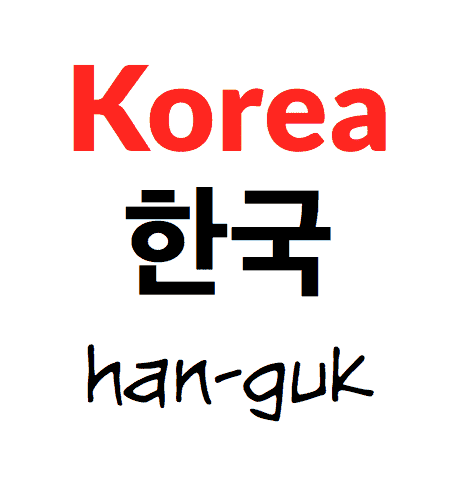Get ready to learn how to say “Korea” in Korean because we’re going to teach you how in about 5 minutes flat!
We’ll also explain why many people get the pronunciation wrong (without even knowing it!).
This is one of the first words many people learn in Korean since it’s often used when speaking Korean or traveling to Korea.
It comes up time and time again, so we’re going to make sure you are prepared.
Let’s get to it!
In this short lesson, we’ll get you to use the word and some other forms of it. We’re going to teach you how to say “Korea” in Korean, and as a bonus, we’ll give you some sample sentences and ideas for how to remember them easily.
Let’s get right into it.
Contents
What is “Korea” in Korean?
The way to say “Korea” in Korean is . Just two syllables! Take a look at how it’s written in Korean and get a feel for its pronunciation:
Many people are confused because the final ㄱ syllable in 국 is pronounced softly. If you try to pronounce it distinctly, it will be a bit difficult and sound strange. Instead, you can make it more of a lighter pronunciation.
Sample Sentences
We’ve added some sample sentences to help you get a feel for how the word “Korea” in Korean is used. Can you still remember the word? Try to find it in the sentences below and grasp their meaning.
As we mentioned before, your main study focus should always be on the practical usage of the word in phrases and conversation, so this should help.
Example (Formal):
저는 한국을 좋아합니다. (jeoneun hangugeul joahamnida)
I like Korea.
한국의 문화는 매우 따뜻하고 친절합니다. (hangugui munhwaneun maeu ttatteuthago chinjeolhamnida)
Korea’s culture is very warm and hospitable.
Example (Standard):
한국의 수도는 서울이다. (hangugui sudoneun seourida)
The capital city of Korea is Seoul.
Example (Informal):
한국에서 영어를 가르치고 있어요. (hangugeseo yeongeoreul gareuchigo isseoyo)
I am teaching English in Korea.
Romanization and Vocabulary Memorization – A Warning
As you can see, we’ve written the Romanized version of the word above to assist with pronunciation for beginners. It’s definitely a great way to pronounce new words when you’re just starting out easily. That being said, if you intend to delve into learning the Korean language, we recommend avoiding Romanization altogether and just becoming comfortable with Hangul (the Korean alphabet).
“Why?” you might ask. Well, we’re glad you asked! The biggest reason that Romanization can be confusing is that the English characters cannot perfectly replicate the sounds that Korean characters make. Add that to the fact that there are multiple methods for romanizing Korean, and it just complicates things.
You need to learn each method to be able to read the words since different websites or signs may use different methods. Cut out the time it takes you to learn Romanization methods and just invest 90 minutes in learning to read Korean – that’s really all it takes!
Picking up vocabulary words here and there is a great way to help you start getting a feel for the Korean language, but if you really want to start having conversations or be able to use the language, it won’t get you very far.
We recommend starting to learn some phrases or taking a course and studying the grammar of the language. Take a look at our free list of Korean phrases, or consider joining our full Korean course, and we’ll help you learn Korean in 90 days!
Other Ways to Say “Korea” in Korean
Although Koreans most often refer to Korea as there are ways to specifically refer to North and South Korea.
“South Korea” in Korean
The full name of the Republic of Korea is 대한민국 (daehanminguk) which translates as ‘The Democratic Nation of the Great Han.” You’ll often hear this being chanted during international events to show a sense of pride for Korea.
“North Korea” in Korean
Also, as you may know, Korea is divided into two different nations. We have been specifically talking about South Korea, but if you wish to refer to North Korea, you can say , which literally means “North Korea.”
Korean People and Korean Language
Now that you’ve learned how to say “Korea” in Korean, you’re ready to move on to some upgrades! Let’s learn the ways to refer to a Korean person and the Korean language:
Korean (person) – or 한국 사람 (hanguksaram)
Korean (language) –
If you’re curious about the Korean language, go here: https://www.90daykorean.com/korean/
How to Remember the Word
Learning new Korean vocabulary words isn’t easy! It takes some time to let them sink in. You can speed up the process by making associations to help you remember them rapidly.
Finding words that sound similar in English or making silly pictures in your head are two easy ways to go about this. If you have a base knowledge of some simply Korean vocabulary, you can also use those as associations.
For example, imagine Han Solo from Star Wars! The word “Han” sounds similar to the first syllable of the word . Also, the second syllable (국 | guk) is the same as the word for ‘soup’ in Korean. Imagine Han Solo visiting Korea and sitting down to a nice hearty bowl of Korean soup (국 | guk)!
Wrap Up
What’s your favorite thing about Korea? Do you have any ways you like to remember this word? Leave a comment below and let us know!







I’m new in learning Korean, in my textbook 한국 pronunciation is 항국 (hang guk) because of consonant assimilation.
But I heard in korean drama 한국 pronunciation is han guk.
Which one is correct? Han guk or hang guk?
‘Hanguk’ is the correct pronunciation for 한국. ^^
Hi! What is the difference between 한국인 and 한국 사람? I know 사람 means person? What does 인 mean? I’ve seen 한국 사람 used a lot in textbooks and learning apps, and I’ve seen 한국인 used elsewhere. Is it more common to say 한국인 in conversation, or are both used often?
Hi! 한국인 and 한국 사람 both mean “Korean” they are two different words with the same meaning. 인 is a sino-Korean word(derived from Chinese) meaning ‘person’ while 사람 is a pure Korean word (native Korean) meaning the same. Both are used commonly so you can use either one. ^^
omg i love korea
Awesome! ^^
hello I would like to ask, which form is correct for the “geurakoreu”? This is for my f&b brand and I wanna include the hangul version of it. stand for the abreviation of”gerobak korea”. Is it “그라꼬르” or “그라코르”? thank you in advance for the help
Hi, Munj! I think ‘그라코르’ would be better. ^^
Hey! I’m trying to learn Korean and I’m making a front page for my exercise book. I want to say ‘Korean study’ on the front page but I don’t really know how yet… Google says it is 한국 학습
Is this right?
I’m not an expert but I know the base form of to study is 공부하. So maybe 한국어 공부?
공부 is the noun `study`, so 공부하다 (`do study`) is the base form of the verb `study`. I think ‘한국어 공부’ is OK.
Hi! I know I’m a little late. I’m not korean, but I think the right way is to say “한국어를 공부해요”
한국어를 공부해요 will make it “Study Korean” which is fine to use as well! Thank you for the comment, Trixie. ^^
Hi Indra,
Sky is right. the base form is 공부하다 so 한국어 공부 is better
Thank you so much!